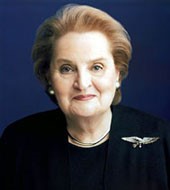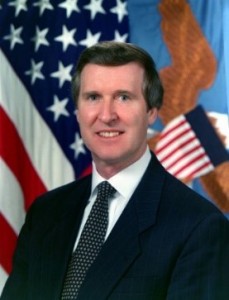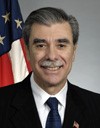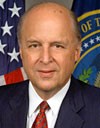 U.S. Department of State Office of the Historian
U.S. Department of State Office of the Historian
Strong Push for Export Bank
Today, national security leaders submitted a letter to Congress to impress the importance of reauthorizing the Export Import Bank (often referred to as Ex-Im). The bank furthers international trade and enhances American national security.
Signatories of the letter include Former U.S. Secretary of State Madeleine Albright, Former U.S. Secretary of Defense William Cohen, Former Secretary of Commerce Carlos Gutierrez, Former U.S. Trade Representative Carla Hills, Former Director of National Intelligence John Negroponte, Former White House Chief of Staff Thomas McLarty, among others.
This issue is one of bipartisan concern, national security implications, economic competitiveness consequences and importance for the future of many U.S. business owners. Can we afford to sabotage America’s economic and national security? The experts have spoken, and their answer should be no surprise. We must continue to foster economic growth and competitive advantage for American business.
The Export Import Bank facilitates American business expansion into foreign markets which hold tremendous opportunity for cooperation, growth and stability. Accounts in these regions can be difficult for small to medium sized American enterprises to access. Even when clients are located and orders are confirmed, many commercial banks are far too wary of foreign customers to provide the necessary loans for American companies to finance the orders. This leaves American business at a most detrimental disadvantage.
This is where the services of the Export Import Bank are of a critical significance. Ex-Im provides services such as political risk insurance, loan guarantees and direct loans which would otherwise be unavailable to American businesses. Most other nations (particularly our strongest rivals) have their own export credit agencies which they are bolstering through substantial budget increases. Every nation is competing for limited resources, trade and opportunity. America cannot falter in its endeavor to promote informed, fair and sustainable trade policy through increased economic engagement.
The letter sent to Congress also addresses this disparity between American policy and those of our competitors. While the United States has worked diligently towards opening markets and creating a system of free trade, some other nations have labored to undermine and undercut U.S. economic development. These nations do not abide by the same principles as the United States and their impact on foreign markets can be detrimental to all involved.
The Ex-Im Bank is a necessary counterbalance needed to allow American made products to compete in the same market as inferior quality goods promoted through dishonest trade practice. The letter summarizes this unequitable burden on American business by stating “Unilateral disarmament has never been considered a viable defense policy, and we cannot think of a reason why it should be considered a rational export policy.”
There is no question that U.S. business has benefitted from the work of Ex-Im. During fiscal year 2013, Ex-Im estimated that 89% of their authorizations were in support of small business. Now in the fifth year of their Global Access for Small Business initiative, Ex-Im continues to proactively seek out these often neglected assets through seminars as well as City/State partnerships and marketing programs. These local affiliations allow Ex-Im to target their efforts where they are needed most. As the bank approaches the final months of its reauthorization window, there are far more stakeholders watching than just Washington heavyweights. Many American small businesses hang in the balance.
The full text of the letter is below:
February 11, 2015
The Honorable John Boehner
Speaker of the
House of Representatives
Washington, D.C. 20515
The Honorable Nancy Pelosi
Democratic Leader
House of Representatives
Washington, D.C. 20515
The Honorable Mitch McConnell
Majority Leader
United States Senate
Washington, D.C. 20510
The Honorable Harry Reid
Democratic Leader
United States Senate
Washington, D.C. 20510
Dear Speaker Boehner, Senator McConnell, Senator Reid, and Representative Pelosi:
We recognize the many challenges requiring Congressional attention today, but as the 114th Congress begins its work this year, we write to encourage Congress to make one a particular priority – the reauthorization of the US Export-Import Bank, or Ex-Im Bank.
From our prior experience in government, each of us has seen how commercial and economic diplomacy have become critical elements of US national security. The involvement of US companies in emerging markets is fundamentally beneficial to the American economy while helping to drive growth, prosperity and political stability abroad. When companies in America export their goods to foreign countries, they promote transparency and sound business practices, and in many cases share knowledge, provide training, and increase investment and employment in the markets where they operate. All of this helps to spread American values and strengthen our interests, while creating jobs and sustaining economic growth here in the United States. American economic engagement through exports to foreign countries is truly a win-win proposition, and the American government must do what it can to support our companies on the front lines.
The Ex-Im Bank is one of the most important tools in our system of government to enable US companies to compete and secure business in overseas markets. As much as the United States has done to promote the creation of free markets and fair trade, it remains an imperfect world. The foreign competitors of US manufacturers all have access to export credit agencies in their countries of origin – many of which are much larger and do not abide by the same stringent rules as the Ex-Im Bank. The Ex-Im Bank levels the playing field for our companies, whether small, medium or large, and enables them to participate in international tenders where their goods and services will be evaluated on an equal basis against their foreign competitors. Indeed, many global customers require access to export credit agency funding as a prerequisite to submit a proposal. Without access to the Ex-Im Bank, US manufacturers could lose deals before they even begin to assemble their bids.
To us, it is inconceivable that some in Congress could contemplate dismantling the Ex-Im Bank while the dynamics of global trade remain as they are. Unilateral disarmament has never been considered a viable defense policy, and we cannot think of a reason why it should be considered a rational export policy. By way of example, the government of China has announced a new initiative to devote an additional $10 billion in export credit to Africa – bringing China’s total to $30 billion, roughly the equivalent of the Ex-Im Bank’s global volume for the year. This will enable Chinese firms to expand their reach in the continent – particularly in the infrastructure sector, where projects can have a lifespan of twenty to thirty years. In an environment such as this, we should be exploring how to strengthen the Ex-Im Bank through sound reform and expand its efforts to counter the aggressive moves of our economic competitors.
We urge you to support reauthorization of the Ex-Im Bank’s charter immediately. Our national security and economic interests depend upon it.
Sincerely,
Madeleine Albright, Former U.S. Secretary of State
Richard Armitage, Former U.S. Deputy Secretary of State
Samuel Richard “Sandy” Berger, Former U.S. Assistant to the President for National Security Affairs
William Cohen, Former U.S. Secretary of Defense
Kenneth M. Duberstein, Former White House Chief of Staff
Carlos Gutierrez, Former U.S. Secretary of Commerce
Stephen Hadley, Former U.S. Assistant to the President for National Security Affairs
Carla Hills, Former U.S. Trade Representative
General James L. Jones, Former U.S. Assistant to the President for National Security Affairs and Former Supreme Allied Commander Europe and Combatant Commander
Ron Kirk, Former U.S. Trade Representative
Thomas “Mack” McLarty, Former White House Chief of Staff
John Negroponte, Former Director of National Intelligence












